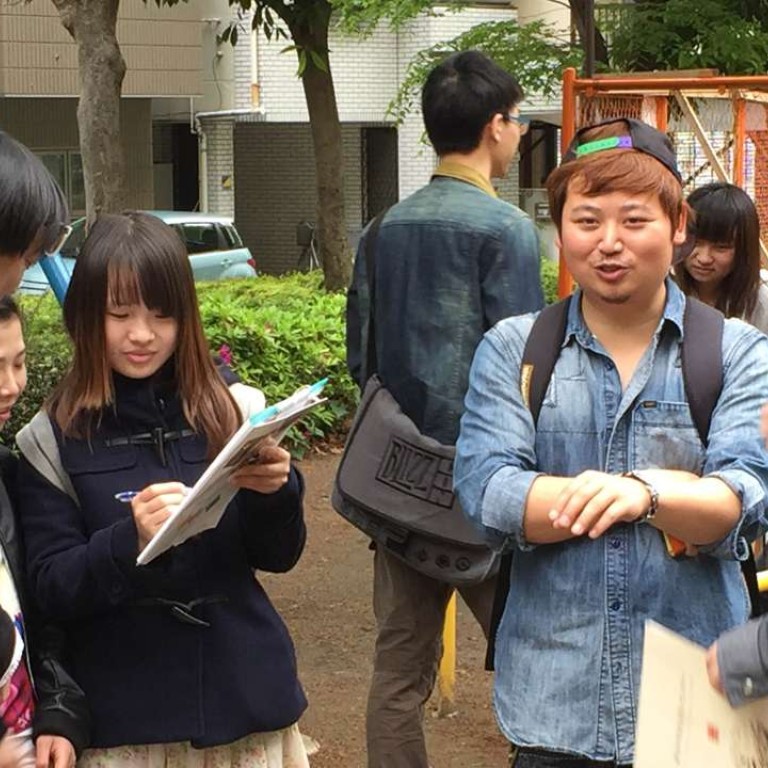
Tokyo’s Sunday language circle building bridges between China and Japan
Weekly chat group helps people from both countries better understand and learn more about each other
Every Sunday afternoon, rain or shine, a group of people gathers at a park in Tokyo’s bustling Ikebukuro district, where Japanese people studying Chinese and Chinese living in Japan can engage in lively conversation.
At the gathering, which is a Chinese-language circle called Hanyu Jiao, or “Chinese chat session”, the topics range from China’s politics, economy, popular television series and tourism spots to cultural differences between Japan and China.
The Sunday Chinese Corner was launched by Duan Yuezhong, chief editor of Duan Press Co, a publishing house in Japan that specialises in books on Sino-Japanese relations, many of which are written by Chinese authors and translated into Japanese.
Duan, 58, said his endeavour was an outcome of China and Japan building closer ties in various fields in recent years. More Japanese have started studying Chinese and want to know about what’s happening in the Chinese community, he said.
“When I was in China, there were many such platforms as English chat sessions and French chat sessions to assist language learners. Why not establish a Chinese chat session in Japan to help Japanese study Chinese?” said Duan, who came to Japan in 1991 to join his wife who was studying here.
In August 2007, the former reporter for the state-run China Youth Daily set up the first Chinese chat session in Tokyo to help Japanese study the Chinese language and promote grassroots communication between the two countries.
Since then, participants including government officials, company workers, university professors and young students have joined the weekly gathering in Nishi Ikebukuro Park, close to a new Chinatown that has emerged in recent years.
The chat session is free of charge from 2pm to 5pm, and those interested are welcome to come and go as they please.
Participants start by introducing themselves, both in Japanese and Chinese. They then divide into small groups where they can speak freely. Each event draws from 10 to more than 100 participants.
Joining the Chinese chat session allows me to speak Chinese again and I can get the latest news in China from the participants
Kazuhiko Sugimoto, 70, a long-time participant of the event, once worked in a bank in Beijing. He said he had no chance to speak Chinese after returning to Japan.
He learned of the Chinese chat session from Duan, who has a PhD in international relations from Niigata University in central Japan.
“Joining the Chinese chat session allows me to speak Chinese again and I can get the latest news in China from the participants,” Sugimoto said at the 435th event, where 36 people were in attendance.
Mitsuru Iguchi, 59, who became interested in Chinese after listening to songs of the late Taiwanese singer Teresa Teng, visited the chat session after arriving from Osaka.
He took part in the event many times before moving to Osaka, where there is another Chinese chat session on a smaller scale.
“Participants are few in Osaka’s Chinese chat session, so it makes me miss Tokyo. If you have friends in Osaka, please tell them there is also a Chinese chat session there,” Iguchi said following his self-introduction.
Through the activity, not only can Japanese people learn Chinese, but young Chinese who have just arrived in Japan can also get a chance to talk to Japanese.
Yoshikazu Ishino, 56, a teacher at Kyoshin Language Academy, a Japanese language school, took seven foreign students – six from China and one from Bangladesh – to the chat session.
“Our students usually study Japanese at classes and libraries. It would be a shame to send students who can’t speak to or listen to Japanese people to universities and into society,” he said.
Most Japanese citizens are friendly, they oppose war
One of his students, Hu Ziyun, 22, who comes from Guangzhou, southern China, said joining the chat session provided him with more opportunities to communicate with Japanese people to find out about what they are thinking.
These days, the Chinese chat has gone beyond its original role as a language circle. It has become an important platform for building bridges between Japanese and Chinese.
“Most Japanese citizens are friendly, they oppose war,” Hu said, adding that this impression differed from what he sometimes saw on Chinese television.
Participants sing Chinese songs, eat Chinese food, some gradually become friends, or even couples.
But the language circle was not always this harmonious.
The number of attendees dropped sharply in 2012 after tensions heightened over the China-claimed Japan-controlled Diaoyu Islands in the East China Sea, known as the Senkakus in Japan, according to the participants.
And even though the present bilateral political situation is not as bad as it was several years ago, the two countries still face difficulties in making tangible progress on repairing relations often damaged by territorial and wartime issues.
Duan, who has dedicated himself to strengthening Sino-Japanese ties, said “face-to-face exchange at a grassroots level is required, as most of the two countries’ people usually pick up information about each other from the media”, which often lead to mutual distrust because they do not fully reflect the realities.
He hopes to expand the number of Chinese language circles from 10 to 100 across Japan.
“The worse the situation [of the bilateral ties] becomes, the more effort we should make, even if the efforts only influence one person,” he said.
“Where there are Chinese, there can be Chinese chat sessions.”

